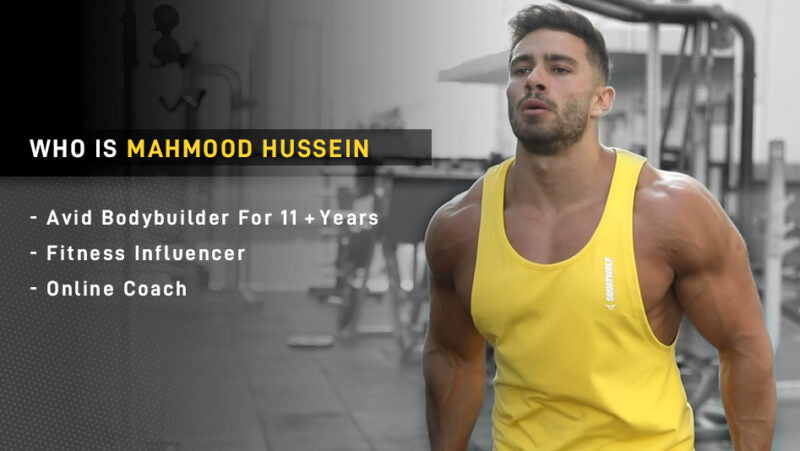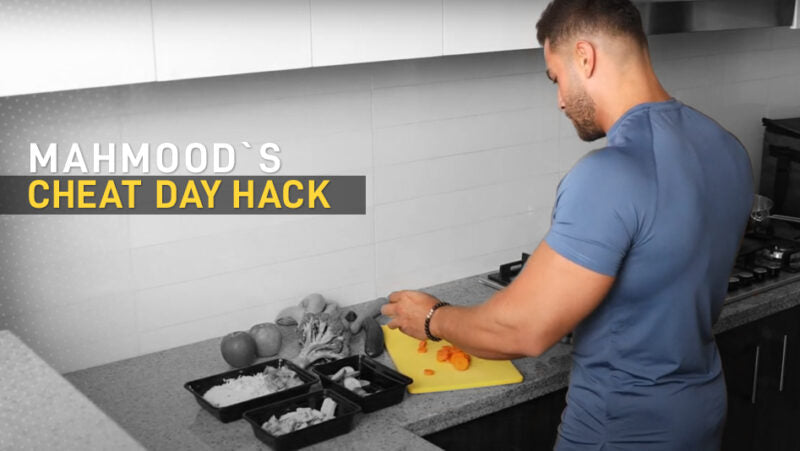Ramadan Diet To Maintain Gains | Mahmood Hussein | Ramadan Series
SQUATWOLF

Say you are a bodybuilder, and it’s Ramadan; what happens to your gains? If you consume the right foods this Ramadan with a proper workout schedule, you can maintain your gains. We talked to Mahmood Hussein, an Online Coach, about staying fit in Ramadan. “During Ramadan, everyone should only maintain what they have because it’s very difficult to bulk or to cut,” says Mahmood.
Ramadan and Covid is a much more complex scenario as gyms are still in limbo across the world. So, you want to aim at maintaining what you have. Reaching your goal requires a mixture of diet and workout. Meaning, this Ramadan, your food will have to be more selective. Mahmood walks us through a diet plan, Ramadan foods to incorporate, tips for eating times, and working out.

Ramadan Food & Diet

“When it comes to fitness, it’s all about what you eat and when to eat. In Ramadan, we are fasting for 16 hours. I have to be careful when to eat and what to eat in the window after Iftari" starts off Mahmood. You have an 8-hour eating window. After a long and tiring day of fasting, it’s raw self-control that stops you from over-consuming—worse, over-consuming unhealthy foods. Now, you need to stock up on the right foods this Ramadan at the correct times.
A four-meal routine can help you stock up on enough calories to fuel your workouts throughout the night and your daytime routine. “When it comes to Ramadan, I’ll have to reduce my meals to four meals, and I’ll have to put more portions inside the meals so that I can hit the macros that I want,” says Mahmood. So, any meals? Well, there are numerous diets and approaches to meal planning and nutrition. However, Mahmood gave us his effective game plan that he has perfected with 11 years of fitness.
1st Meal – The Fast-absorption Meal:
The first foods on your Ramadan list need to be fast-absorbing carbs and proteins to fuel your body quickly.
Fast-absorbing carbs: Mahmood sticks with potatoes for his option of carbs. You can also include these fast-absorbing carbs in your Ramadan food:
- bread
- pasta
- cereals
- bananas
- pineapples
- yams
- white rice
Fast-absorbing proteins: Mahmood’s choices are: white fish, prawns, and chicken. You can also include these fast-absorbing proteins in your Ramadan food:
- egg
- chickpeas
- soy protein
- nuts
After a 16-hour fast, your body needs the energy to operate. If you plan on working out, you’ll need to eat food that you can absorb quickly.
2nd and 3rd Meal:
“These two meals are normal meals. I can eat whatever I want. It has nothing to do with absorption,” continues Mahmood. These two meals are post-workout, so your body needs protein and carbs for recovery. So, if you are on a low-carb diet, your Ramadan food needs to be full of proteins. Eating the right amount of proteins provides the body with amino acids to rebuild muscles for an effective recovery.
Proteins:
- eggs
- Greek yogurt
- salmon
- chicken
- tuna
- protein powders
Carbohydrates:
- sweet potatoes
- quinoa
- fruits
- rice
- oatmeal
- pasta
- dark leafy vegetables
Choose your Ramadan foods according to your targeted calories and macros.
4th Meal – The Slow-absorption Meal:
“Before fasting, I usually have a slow-digestion meal,” says Mahmood. These foods take longer to digest. Mahmood suggests the following slow-digestion Ramadan food:
Slow-digestion carbs:
- artichokes
- asparagus
- okra
- carrots
- beans
- legumes
- whole grains
Slow-digestion proteins: Mahmood suggests eating steak and cottage cheese. Other slow-digestion proteins include:
- turkey
- chicken
- salmon
- tofu
- ricotta cheese
- almond butter
- seeds
These proteins tend to digest slower, giving you protein for about six to eight hours. So, having your heaviest meal at the end keeps you full during your fasting window while giving you the energy to carry out your routine.
Read More Ramadan Guides
Ramadan Workout Routine

While fasting, working out is not a wise idea. You can risk an injury or dehydrate yourself. “1 hour before Iftar, I go for a walk just to burn some calories,” says Mahmood as he talks about his workout routine. “It’s the end of the fasting window. We need water and food. That’s why I don’t go heavy. I don’t sprint. I just go for a walk for an hour or 45 minutes,” continues Mahmood.
While intermittent fasting, it’s recommended to go easy. Try doing some light workouts, cycling, or any other steady-state cardio.
Now, Mahmood’s goal is to maintain his gains for the month of Ramadan. However, you can gain mass if you work out more and have a stricter diet. After you have taken your first meal, your body is ready to lift. You can hit your regular workouts or whatever workout routine you have in mind. Once Mahmood is done having Iftar or his first meal, he goes directly to the gym. His workout routine ranges from one and a half to two hours. Then he starts his 2nd and 3rd meals. Now, working out itself has changed a lot since the start of Covid. Working out during Covid-19 turned home workouts extremely popular. With gyms still in limbo, Mahmood also recommends investing in equipment for a home gym. A bench, a bar, weights, and dumbbells are the basics of a home gym. However, according to Mahmood, working out at home has its drawbacks. Mahmood says, “if I worked out three hours at home, it was like I worked out for 1 hour at the gym.” The difference in time can be due to the limited equipment at home. Nonetheless, doing a workout with whatever you have at home is enough. You can increase the duration of your workouts or intensity to imitate your gym routines.
Shop Gym Equipment
Mahmood’s Cheat Day Hack

In the last part of Mahmood’s interview, we were interested in his cheat days. Given his feed has a lot of burger and pizza pictures, the question was a must. He told us his secret, “I go in a calorie deficit of 1,500 daily for six days. On the 7th day, a Friday, my cheat day, I go crazy. I know my body went into a calorie deficit, so it needs a surplus. So even though I eat burgers and pizza, it’s only once a week, and I’m sure I burn it off.” This strict approach allows him to eat guilt-free on his cheat day. After his calorie surplus, Mahmood increases the intensity of his workouts for the next two days.
A lasting advice
Choose your Ramadan food carefully to meet your fitness goals. Mahmood wraps up the interview by saying, “People eat a lot, eat the wrong choice of food you have to stick to your diet and be consistent.” Hopefully, picking your food this Ramadan should be easier. This proper diet, eating times, and workout routine can help you maintain your gains earned through sweat, blood, and tears.